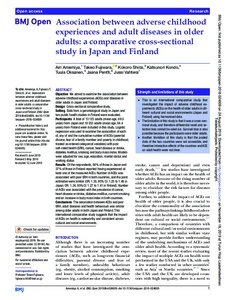Association between adverse childhood experiences and adult diseases in older adults: A comparative cross-sectional study in Japan and Finland
Pentti J.; Kondo K.; Vahtera J.; Shirai K.; Amemiya A.; Fujiwara T.; Oksanen T.
https://urn.fi/URN:NBN:fi-fe2021042826738
Tiivistelmä
Objective We aimed to examine the association between adverse childhood
experiences (ACEs) and diseases in older adults in Japan and Finland.
Design Cross-sectional comparative study. Setting Data from a
gerontological study in Japan and two public health studies in Finland
were evaluated. Participants A total of 13 123 adults (mean age, 69.5
years) from Japan and 10 353 adults (mean age, 64.4 years) from Finland
were included in this study. Logistic regression was used to examine the
association of each of, any of and the cumulative number of ACEs
(parental divorce, fear of a family member and poverty in childhood;
treated as ordered categorical variables) with poor self-rated health
(SRH), cancer, heart disease or stroke, diabetes mellitus, smoking and
body mass index. Models were adjusted for sex, age, education, marital
status and working status. Results Of the respondents, 50% of those in
Japan and 37% of those in Finland reported having experienced at least
one of the measured ACEs. Number of ACEs was associated with poor SRH in
both countries, and the point estimates were similar (OR: 1.35, 95% CI:
1.25 to 1.46 in Japan; OR: 1.34, 95% CI: 1.27 to 1.41 in Finland).
Number of ACEs was associated with the prevalence of cancer, heart
disease or stroke, diabetes mellitus, current smoking and an increase in
body mass index in both countries. Conclusions The association between
ACEs and poor SRH, adult diseases and health behaviours was similar
among older adults in both Japan and Finland. This international
comparative study suggests that the impact of ACEs on health is
noteworthy and consistent across cultural and social environments.
Kokoelmat
- Rinnakkaistallenteet [19207]
